Here is a brief on the consultation paper proposed by SEBI, the market regulatory, regarding the new asset class. The story explains the features, rules, strategies and more.

The Securities and Exchange Board of India (SEBI) is shaking things up in the investment landscape with a proposal for a brand-new asset class. This class caters to investors with a higher risk appetite and deeper pockets, offering them an alternative to traditional mutual funds with potentially higher yields and greater flexibility. As per SEBI’s consultation paper released on July 16, 2024, the new asset class aimed at bridging the gap between Mutual Funds (MFs) and Portfolio Management Services (PMS) in terms of portfolio construction flexibility.
But it is not just about creating new options; SEBI also aims to tackle the rise of unregulated investment schemes that lure investors with unrealistic promises. Here is what you should know about the new asset class.
Can everyone invest in this new asset class?
To ensure this class attracts investors who are comfortable with a higher degree of risk, SEBI proposes a minimum investment of Rs 10 lakh. This effectively discourages retail investors who might be better suited for the relative stability of traditional mutual funds.
As per the consultation paper, the goal of this new asset class is to provide investors with a regulated investment product that allows for more risk-taking while having a higher ticket size than MFs. This initiative seeks to address the issue of investors being drawn to unregulated and unauthorised investment schemes that may promise unrealistic returns.
Who can sell this product?
When it comes to which asset management companies (AMCs) can offer this product, there are certain eligibility criteria. Not just any fund house can offer this new product.
SEBI proposes a two-pronged approach for eligibility. Established mutual funds with a proven track record can participate directly. For newer players or those without a strong history, the path involves appointing highly experienced fund managers to steer the ship. This ensures a certain level of expertise managing these potentially complex investment strategies.
Structure and Investment Strategies
The new class will borrow some structure from mutual funds offering greater flexibility. AMCs will offer a variety of ‘Investment Strategies’ within this class. Unlike traditional MF schemes with standardised structures, these strategies can have varying redemption frequencies. This allows fund managers to tailor the investment approach to optimise liquidity based on the underlying assets.
Some of the investment strategies that may be permitted include long-short equity funds where the fund seeks to deliver returns by taking long and short positions in equity and equity-related instruments. So, for instance, the fund may be bullish on the automobile sector and bearish on IT sector and may invest in both these sectors by going long on the automobile sector and short on the IT sector.
Another product is inverse ETF (exchange-traded fund), where the fund generates returns that are negatively correlated to the returns of the underlying index.
Relaxed Investment Rules
Compared to the traditional MFs with their set investment restrictions, the new class offers more freedom. This includes relaxed limits on holdings in debt securities, equities, and Real Estate Investment Trusts (REITs) and Infrastructure Investment Trusts (InvITs). This wider range allows for potentially more diversified portfolios and the chance for enhanced returns.
Further, unlike MFs that primarily use derivatives for hedging purposes, the new class will permit their use for active investment strategies. This gives fund managers more tools to navigate the market and potentially capitalise on opportunities. However, SEBI proposes a cap on the total derivative exposure to ensure responsible risk management.
Compliance requirements
SEBI understands the importance of clear distinction between the new class and traditional MFs. They want to avoid any confusion that could erode investor confidence in existing products. To achieve this, the new class will have a separate risk classification system and require AMCs to disclose portfolio details on a monthly basis.
Looking Ahead
SEBI is currently seeking public feedback on various aspects of the proposal. This includes the official name for the new class, its structure, the specific investment restrictions, and the disclosure requirements. The regulator is also keen on hearing suggestions for potential investment strategies that could be offered under this framework. This open approach highlights SEBI's commitment to creating a well-defined and beneficial investment option for the targeted audience.
That said, the views among industry experts are divided. On one side, the introduction of this new asset class has the potential to be a game-changer for investors in India. It offers a wider range of investment options, fosters a more regulated investment environment, and empowers investors with a higher risk tolerance to potentially achieve their financial goals. But it remains to be seen how the taxation aspect will pan out. But, on the other hand, few experts feel, it could dilute the proposition for products such as PMS and AIFs (alternative investment funds).
As such, many nitty gritty about the new asset class is yet to be worked and investors and industry will have to wait.
Recent Blogs
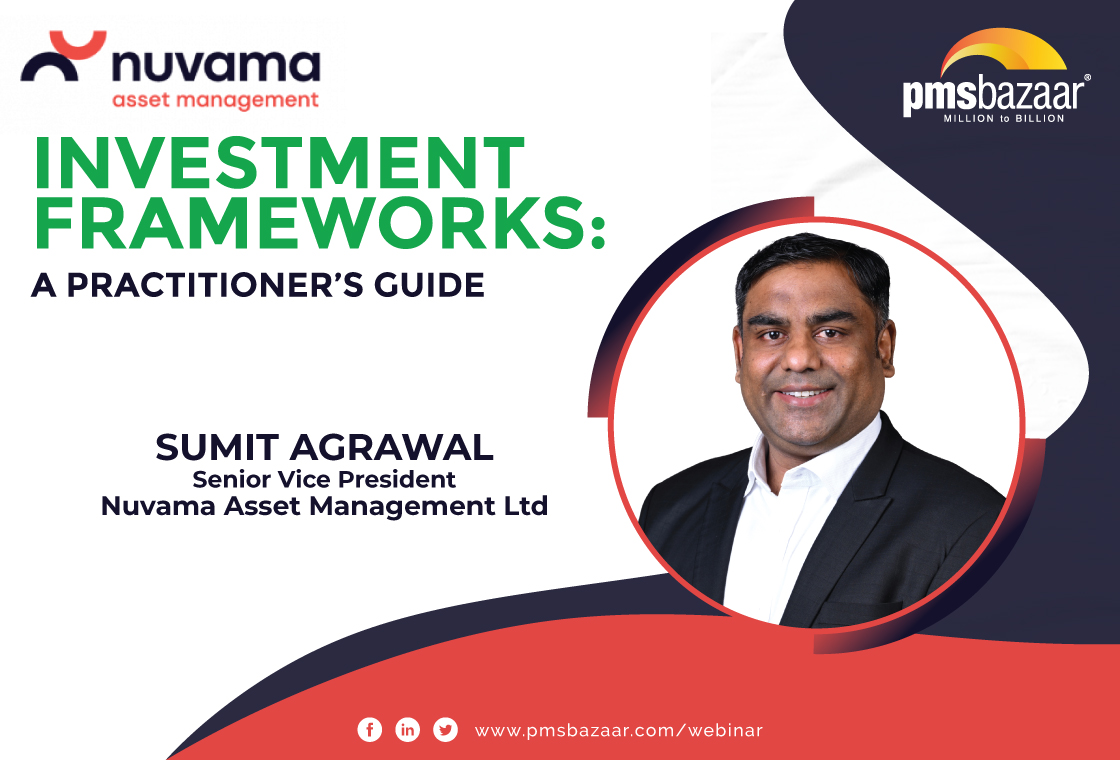
Investment Frameworks : A Practitioner’s Guide
PMS Bazaar recently organized a webinar titled “Investment Frameworks: A Practitioner’s Guide,” which featured Mr. Sumit Agrawal, Senior Vice President, Nuvama Asset Management Limited. This blog covers the important points shared in this insightful webinar.
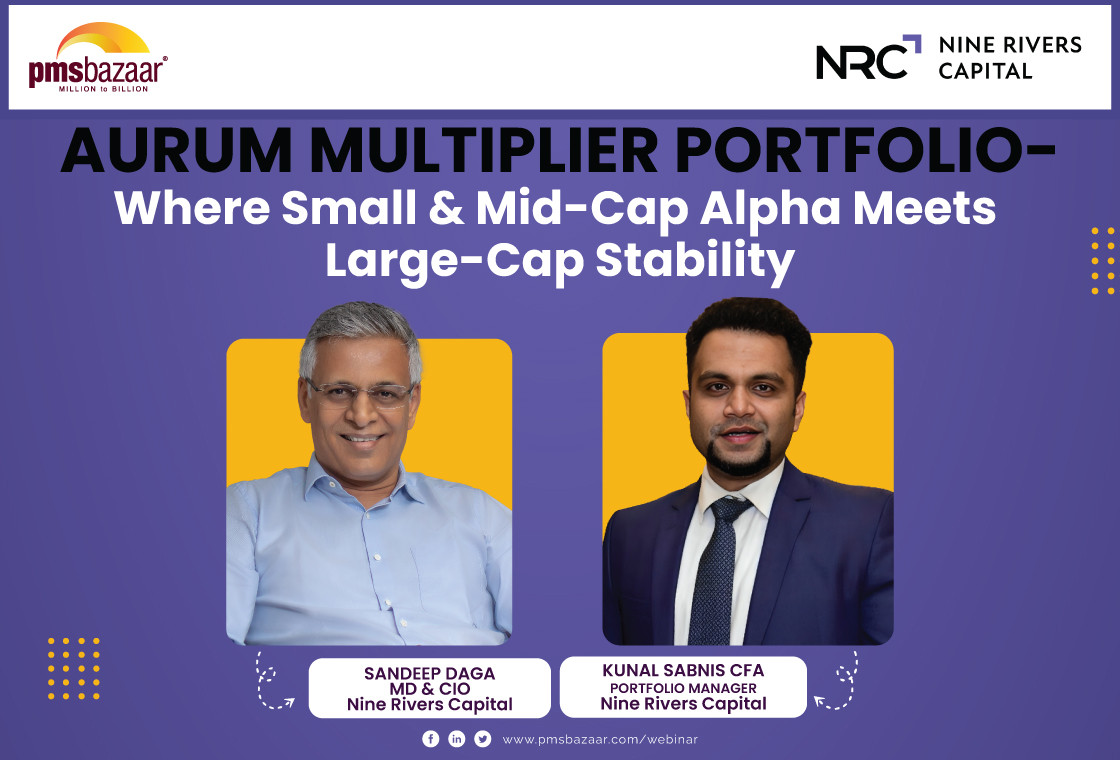
Aurum Multiplier Portfolio - Where Small and Mid-Cap Alpha Meets Large-Cap Stability
PMS Bazaar recently organized a webinar titled “Aurum Multiplier Portfolio - Where Small and Mid-Cap Alpha Meets Large-Cap Stability,” which featured Mr. Sandeep Daga, MD& CIO, Nine Rivers Capital and Mr. Kunal Sabnis, Portfolio Manager, Nine Rivers Capital. This blog covers the important points shared in this insightful webinar.

Flat Markets, Wide Outcomes: How 484 PMS Strategies Performed in Dec 2025
December 2025 was a month where market returns stayed close to flat, with the Nifty 50 TRI at -0.28% and the BSE 500 TRI at -0.24%.
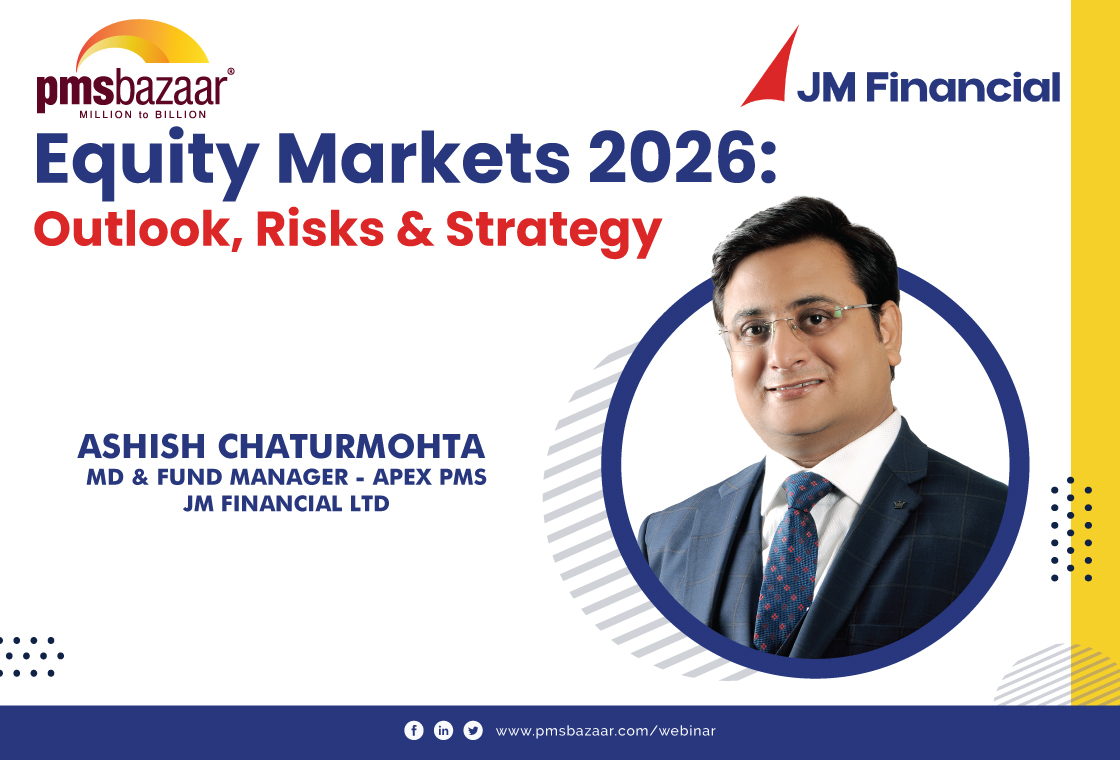
Equity Markets 2026: Outlook, Risks and Strategy
PMS Bazaar recently organized a webinar titled “Equity Markets 2026: Outlook, Risks and Strategy,” which featured Mr. Ashish Chaturmohta, MD & Fund Manager – APEX PMS, JM Financial Limited. This blog covers the important points shared in this insightful webinar.

MICRO CAPS: The Dark Horses of the Indian Equity Market
PMS Bazaar recently organized a webinar titled “MICRO CAPS: The Dark Horses of the Indian Equity Market,” which featured Mr. Rishi Agarwal and Mr. Adheesh Kabra, both Co-Founders and Fund Managers, Aarth AIF. This blog covers the important points shared in this insightful webinar.
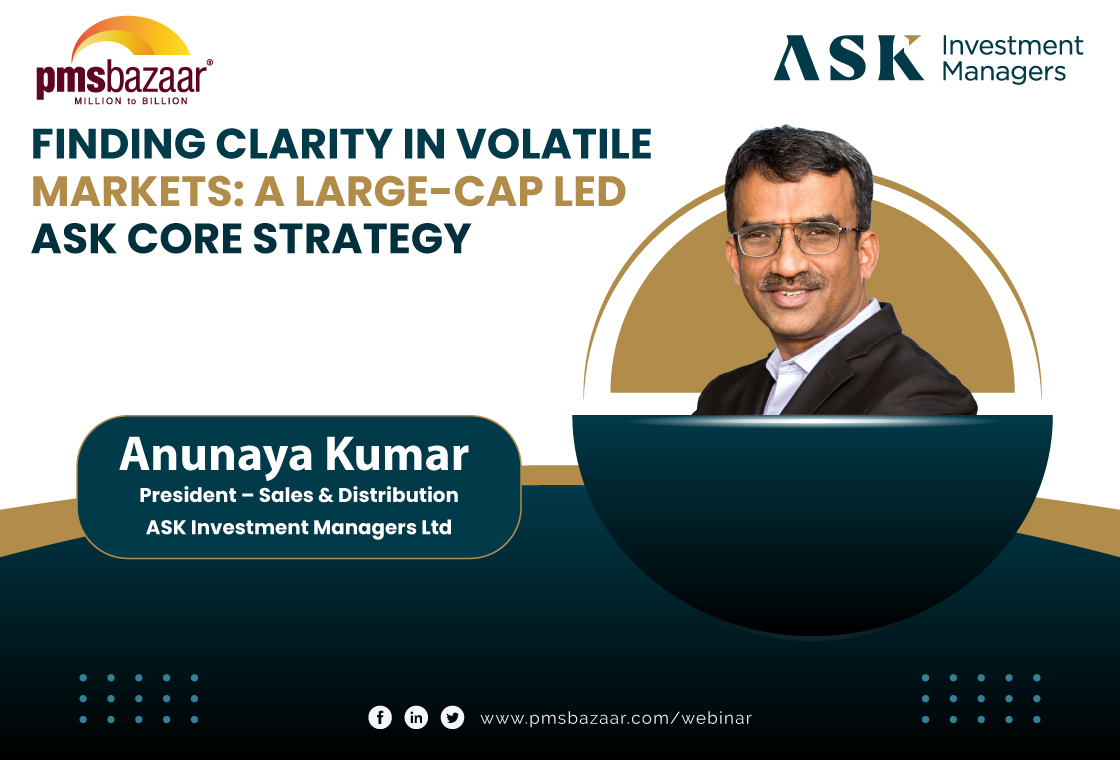
Finding Clarity in Volatile Markets: A Large-Cap Led ASK CORE Strategy
PMS Bazaar recently organized a webinar titled “Finding Clarity in Volatile Markets: A Large-Cap Led ASK CORE Strategy,” which featured Mr.Anunaya Kumar, President – Sales and Distribution ASK Investment Managers Limited. This blog covers the important points shared in this insightful webinar.
.jpg)
Passively Active Investing — A Modern Investor’s Lens on ETF-Based PMS
PMS Bazaar recently organized a webinar titled “Passively Active Investing — A Modern Investor’s Lens on ETF-Based PMS,” which featured Mr. Karan Bhatia, Co-Founder and Co-Fund Manager , Pricebridge Honeycomb ETF PMs. This blog covers the important points shared in this insightful webinar.
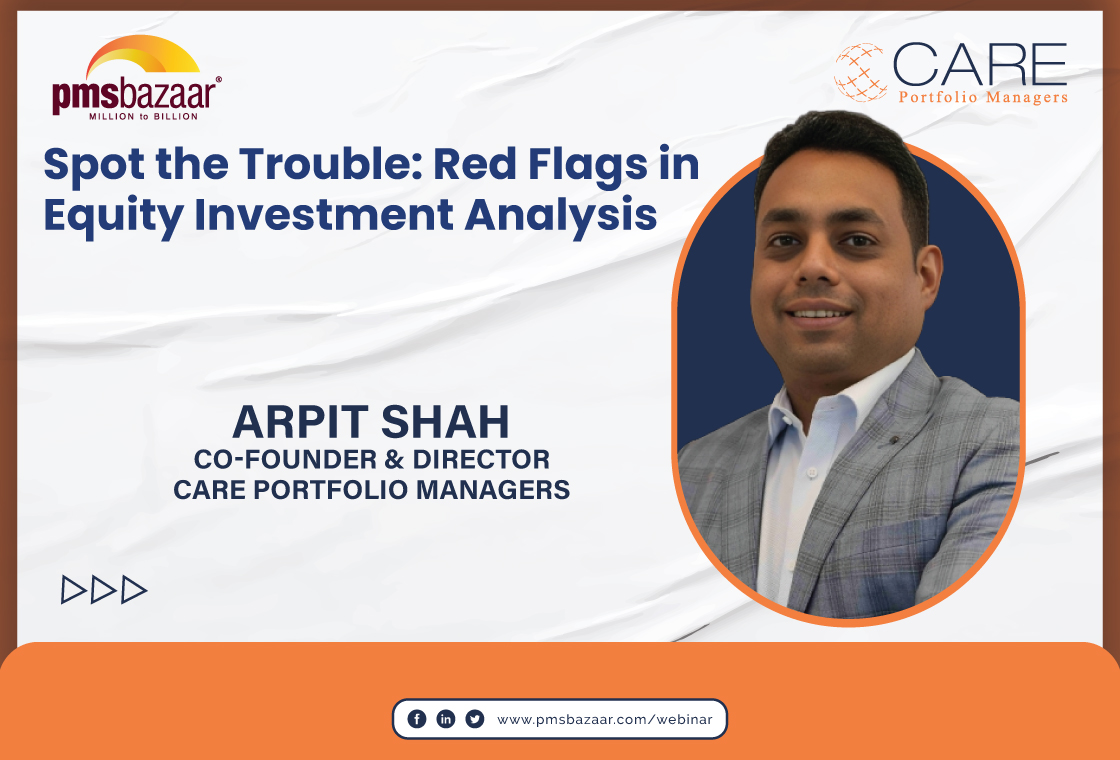
Spot the Trouble: Red Flags in Equity Investment Analysis
PMS Bazaar recently organized a webinar titled “Spot the Trouble: Red Flags in Equity Investment Analysis,” which featured Mr. Arpit Shah, Co-Founder & Director, Care Portfolio Managers. This blog covers the important points shared in this insightful webinar.

